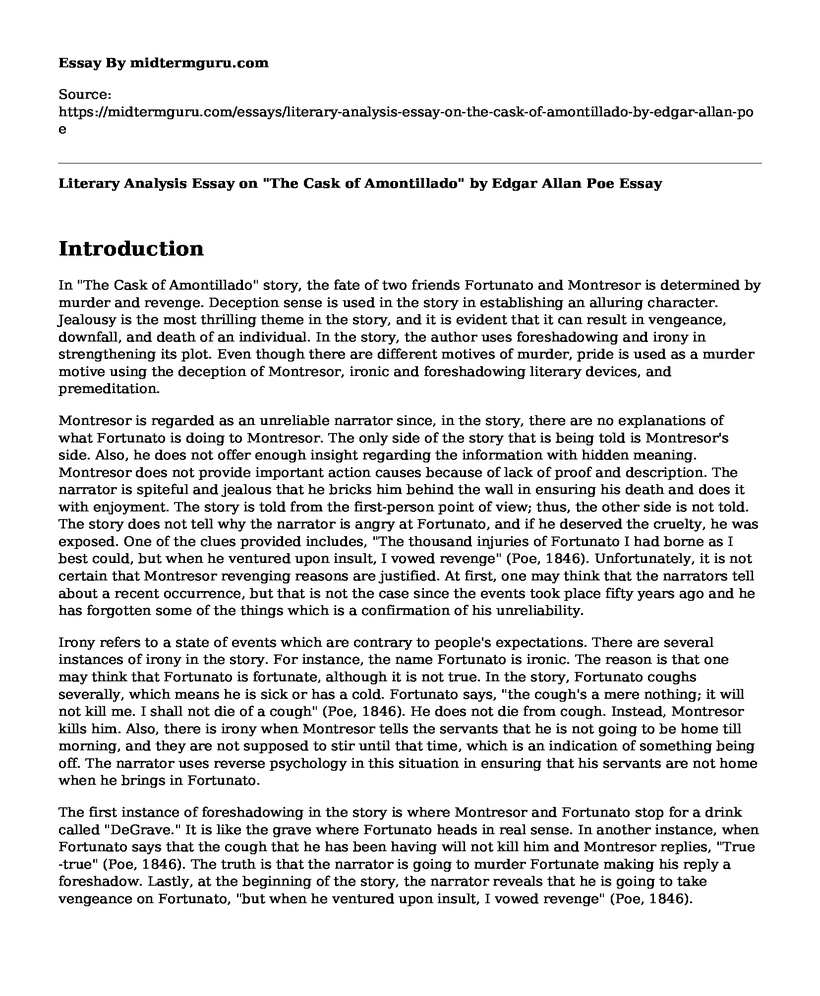Introduction
In "The Cask of Amontillado" story, the fate of two friends Fortunato and Montresor is determined by murder and revenge. Deception sense is used in the story in establishing an alluring character. Jealousy is the most thrilling theme in the story, and it is evident that it can result in vengeance, downfall, and death of an individual. In the story, the author uses foreshadowing and irony in strengthening its plot. Even though there are different motives of murder, pride is used as a murder motive using the deception of Montresor, ironic and foreshadowing literary devices, and premeditation.
Montresor is regarded as an unreliable narrator since, in the story, there are no explanations of what Fortunato is doing to Montresor. The only side of the story that is being told is Montresor's side. Also, he does not offer enough insight regarding the information with hidden meaning. Montresor does not provide important action causes because of lack of proof and description. The narrator is spiteful and jealous that he bricks him behind the wall in ensuring his death and does it with enjoyment. The story is told from the first-person point of view; thus, the other side is not told. The story does not tell why the narrator is angry at Fortunato, and if he deserved the cruelty, he was exposed. One of the clues provided includes, "The thousand injuries of Fortunato I had borne as I best could, but when he ventured upon insult, I vowed revenge" (Poe, 1846). Unfortunately, it is not certain that Montresor revenging reasons are justified. At first, one may think that the narrators tell about a recent occurrence, but that is not the case since the events took place fifty years ago and he has forgotten some of the things which is a confirmation of his unreliability.
Irony refers to a state of events which are contrary to people's expectations. There are several instances of irony in the story. For instance, the name Fortunato is ironic. The reason is that one may think that Fortunato is fortunate, although it is not true. In the story, Fortunato coughs severally, which means he is sick or has a cold. Fortunato says, "the cough's a mere nothing; it will not kill me. I shall not die of a cough" (Poe, 1846). He does not die from cough. Instead, Montresor kills him. Also, there is irony when Montresor tells the servants that he is not going to be home till morning, and they are not supposed to stir until that time, which is an indication of something being off. The narrator uses reverse psychology in this situation in ensuring that his servants are not home when he brings in Fortunato.
The first instance of foreshadowing in the story is where Montresor and Fortunato stop for a drink called "DeGrave." It is like the grave where Fortunato heads in real sense. In another instance, when Fortunato says that the cough that he has been having will not kill him and Montresor replies, "True -true" (Poe, 1846). The truth is that the narrator is going to murder Fortunate making his reply a foreshadow. Lastly, at the beginning of the story, the narrator reveals that he is going to take vengeance on Fortunato, "but when he ventured upon insult, I vowed revenge" (Poe, 1846).
Conclusion
In conclusion, literary devices, including irony and foreshadowing, are used in showing murder and revenge in the story. Also, the narrator is unreliable as he does not say what Fortunate did to him that he had to revenge. the name Fortunato is one of the ironies in the story, and DeGrave, where Fortunato and Montresor had a drink, is a foreshadow.
References
Poe, E. A. (1846). The Cask of Amontillado.
Cite this page
Literary Analysis Essay on "The Cask of Amontillado" by Edgar Allan Poe. (2022, Sep 11). Retrieved from https://midtermguru.com/essays/literary-analysis-essay-on-the-cask-of-amontillado-by-edgar-allan-poe
If you are the original author of this essay and no longer wish to have it published on the midtermguru.com website, please click below to request its removal:
- The Liars Club Memoir by of Mary Karr
- Analysis of A View From the Bridge by Cherokee Paul McDonald - Paper Example
- Critical Essay King Lear: Doube Pots
- The Remains of the Day - Literary Analysis Essay
- The Literature of Protest: The Yellow Wallpaper by Charlotte Perkins Gilman
- Kafka's Story: A New Era of Writing in Literature - Essay Sample
- Essay Sample on Romeo and Juliet's Death







